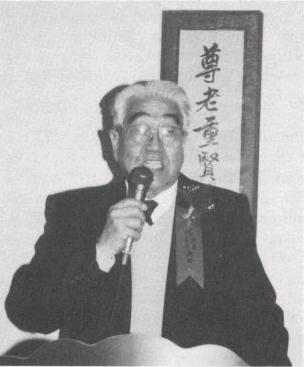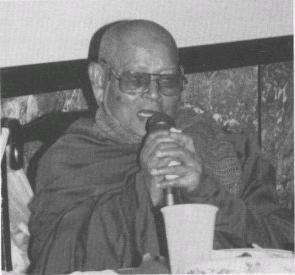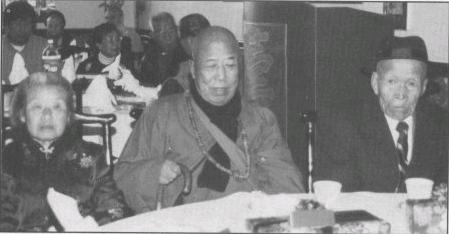|
現場摘要
法會當天來賓總數超過兩百人,現場以各式「壽」字、鮮花盆景佈置得莊嚴清新,尤其特別地是上人親作懸於壁上的賀壽聯「尊老重賢耆年壽考福慧雙圓,學佛習聖耄耋齡高道德齊臻」,橫聯寫著「松柏長青」。因為上人特別重視敬老,因此親自選購禮物,簽名後與老人結緣。
餐會開始,司儀周果如居士致詞,接著上人請主席楊富森教授致詞。他在致詞後,便帶大家唱生日快樂歌,並朗讀上人作的賀壽聯鼓勵大家作詩對句。接著由一位美籍法師說明餐會的意義:敬老盛會有雙重功德。一、把「孝」這種德行介紹到不重視老人的西方社會。二、吃素不殺生,是尊敬生命、愛惜生命的表現,也因此得長壽的果報。另一位法師講到「壽」字,是為某一個人祝壽,也為天下人祝壽,同時用「壽」字提醒自己盡本分,敬老尊德。
上人特別觀機逗教,向來賓公開長青不老的妙方——不生氣。上人說他本來頭髮都白了,因為學著不生氣,只是學學,還沒有眞不生氣,頭髮又都黑了。在會場中上人不時畫龍點睛的智慧妙用,不斷施與會眾意外法喜。
 |
■楊富森教授
Professor Yang |
楊教授作打油詩一首:「人生七十很平常,八十應是少年郎,生活九十才開始,願君福壽永綿長!」並唱誦自己的詩作,為會場帶來活潑溫馨的氣氛。
這次敬老會最年長的壽星是一百零四歲柬埔寨籍的 Dharmawara 法師,眞一法師也領著信眾前來,在座者尚有多位文教、經政界人物,分別為:吳俊升、楊治全、王師復、李邁先、胡國材、丁時範、鐵鴻業、楊訓苔、李英君等多位教授及宋壽椿將軍。他們表示,宣公上人一向尊敬年老有德的人,講法不咬文嚼字,也不說堂皇的大道理,但平淡中含有深義,讓人得到很大益處。而且上人平易近人,不會高高在上。
 |
■慈祥和藹的 Dharmawara 法師
The compassionate Bhante Dharmawara |
最後由宣公上人解釋對聯的意義作結語。「尊老重賢耆年壽考福慧雙圓」,這是我作夢夢見的,所以做為上聯。醒了就又對了十二個字,「學佛習聖耄耋齡高道德齊臻」,然後加了橫額「松柏長青」,我就用這對聯給各位賀壽,對年老人有用,對年輕人有用,對小孩也有用。有人說這對聯真是文不對題,辭不達意。所以我又把它分門別類,做出四副對聯,一副對聯生了四個孩子,這四個孩子就是小對聯了,是七個字一句,形成一首七律。
「尊老重賢孔孟訓」,這是孔子和孟子教化我們的總綱。孔孟是注重尊老重賢的,他說:「老吾老以及人之老;幼吾幼以及人之幼」「選賢與能,講信修睦」「故人不獨親其親」這就是尊老;「故人不獨子其子」就是重賢,所謂「孝子賢孫」,這是孔孟的家訓,儒家的一種思想。
「學佛習聖釋子傳」,誰教我們學佛呢?釋迦牟尼佛教我們學佛。習聖是佛的弟子都要習聖習賢,要學聖人的行為,聖人的思想和他們的一切儀態。聖人是什麼樣呢?就是「非禮勿視,非禮勿言,非禮勿聽,非禮勿動。」不合乎禮的,就不要做去,所以說釋子傳,釋迦牟尼佛的弟子代代相傳的道理。要學什麼?要學佛的慈悲及習聖的仁義道德,這是「儒」和「釋」。
「耆年壽考祖師教」,道教的祖師教人練氣,學長生不老。想學長生不老,先要不生氣。練氣練個什麼氣啊?就是練不生氣。能練到不生氣,那永遠都不會死的。為什麼人不會死?就因為不生氣。會生氣怎麼就死了呢?因為你把氣都冒了嘛!所以死得就快了。所以出氣不是好辦法,氣一出去,不能抱元守一,不能執中貫一,不能萬慮歸一,這都叫冒氣了。你們聽「冒氣」這兩個字是俗話,覺得很好笑,其實這裡面有深意、有道意、有佛意、有人意。
「耄耋齡高天地寬」,這耄耋齡高是對耆年壽考的。七十曰耄,八十曰耋,我們人九十多歲也才剛開始學步走。所以頭先楊教授說人生七十很平常,八十還是少年郎。活到九十才開始,做人才開始,祝君福壽永綿長。天地寬,「籠雞有食湯鍋近,野鶴無糧天地寬」,野鶴都認為天地寬。到八、九十歲,根本無拘無束,無罣無礙,無人無我,無是無非。你看這不是天地寬是什麼?到處是自由的。
「福慧雙圓黎民慶」,福圓滿,慧也圓滿。福是人人所願意享的福,慧是智慧。因為有大智慧,有大福報,所以就無處不圓,福也圓,慧也圓。黎民慶,老百姓看你有大福報大智慧,都尊重你,來為你祝賀。黎是黑頭髮的,民不是白頭髮的,大概或者是沒有頭髮的,總而言之,「斑白者不負載於道路矣!」
「道德齊臻草木歡」,道也到了,德也得了。草木歡,草木都歡歡喜喜了。《歸去來辭》上面說:「木欣欣以向榮,泉涓涓而始流,羨萬物之得時,感吾生之形休,已矣乎,寓形宇內復幾時,曷不委心任去留?」
「竹梅冰雪愧予志」,竹和梅花都是耐冰雪的,冰它也不怕,雪它也不怕,還是那麼卓然獨立,沒有什麼可以侵犯它。愧予志,我很慚愧也想這樣子,我的志願也是願吃虧,也願受冷、受餓、受飢、受渴,什麼都願意受。我要忍人所不能忍,讓人所不能讓,吃人所不能吃,受人所不能受的,這是我一個愚癡的志願。一般人都想要佔便宜,惟獨我要吃虧。你看到世界甚麼地方找這樣的笨人?
「松柏長青祝君安」,老年人要像松柏一樣,不服老。祝君安,祝賀每位同胞,每位年高有德的人,都是 good morning, good afternoon.(美好的早晨與美好的午後。) |
|
On-the-Spot Report
Over two hundred guests attended the banquet. The restaurant was decorated with many calligraphic renderings of the character
shou, "Longevity", as well as fresh bouquets and potted plants. Most striking of all was the couplet hanging on the wall, composed by the Venerable Master (lines A and B in box). The title above the couplet read:
Evergreen like the pine and cedars. Because the Master places great importance on venerating the elderly, he personally selected the gifts for the elders and signed each one.
At the beginning of the luncheon, Jou Gwo-ru acted as the Mistress of Ceremonies, and then the Venerable Master invited the Chairman, Professor Richard F. Yang to speak. Afterwards, Dr. Yang led the entire party in singing "Happy Birthday." Then he recited with great feeling the Venerable Master's matching couplet in honor of the birthday party, and encouraged people to match the couplet.
Following that, a Dharma Master explained the meaning of this luncheon, mentioning two equally important merits of this Celebration to Venerate the Elderly: First, to introduce the concept of filiality in Western society, which has failed to emphasize respect for elders; second, to respect and cherish life by being vegetarian, thus earning the reward of longevity. Then another Dharma Master said, "Speaking of the character
shou 'longevity,' we are celebrating this birthday for one person, but we are simultaneously celebrating the birthday of all living beings in the universe. With this character
shou, we should remind ourselves to fulfill our responsibilities and revere the elderly and the virtuous."
The Venerable Master especially regarded those present and taught them a wonderful method for staying young: not getting angry. The Master said that originally his hair was white, but then he learned not to get angry. Even though he's still learning how not to lose his temper, his hair already has turned black.
Throughout the celebration, the Venerable Master would insert astute comments. Those gathered thoroughly enjoyed the Master's gifts of Dharma. Dr. Yang also read a poem and sang some songs he had composed, giving the banquet an aura of lively warmth.
The eldest guest at this birthday banquet was the one-hundred-and-four-year-old Bhante Dharmawara from Cambodia. Dharma Master Jen Yi and some of his disciples also attended. There were also many professors of literature, education and economics, as well as military and political figures, such as Wu Jyun-shen, Yang Jr-chwan, Wang Shr- fu, Li Mai-syan, Hu Gwo-tsai, Ding Shr-fan, Tie Hung-ye, Yang Syun-tai, Li Ying-jyun, Sung Shou-chwun, and others. They described the Venerable Master Hua as always having respected the elderly and virtuous, and said that the Master's lectures are neither stuffy and literal, nor grandiloquent; rather, his simple words always carry profound meaning and people derive tremendous benefit from them. Moreover, the Master is amiable and easy to draw near, for he never takes a superior position.
Finally, the Venerable Master concluded with an explanation of the couplets:
"Respect elders and honor the worthy for their seniority and longevity, and thus blessings and wisdom are perfected." These words appeared to me in a dream, so I used them as the first line of the couplet. After waking up, I composed the second line,
'Learn from the Buddhas and study with the sages, and at the advanced age of seventy or eighty, both the Tao and virtue are reached.' Then I added a title,
'Evergreen like the pine and cedars.' This couplet is my birthday gift to you all. It can benefit elders, young people and children as well. Someone said that this couplet really fails to express its meaning, so I sorted it out and made another four matches - from one couplet, four sons were produced. These four sub-couplets contain seven words each, making an eight-line poem.
"To respect elders and honor the worthy is the teaching of Confucius and Mencius." This is what Confucius and Mencius essentially taught us. They emphasized having respect for old people and honoring the worthy. Confucius said, 'I treat others' elders just like my own. I treat others' children as if they were my own children.' He also said, 'The worthy take public office, and the capable are given important work to do. Trustworthiness and friendliness are valued by all.' 'To not solely love his own parents' - this is respecting the elders. 'To not singly cherish his own children' - this is honoring the worthy. To be 'filial sons and worthy descendants' is the teaching of Confucius and Mencius; this is a Confucian concept.
"Learn from the Buddhas and study with the sages: this is the teaching transmitted from Shakyamuni." Who teaches us the Dharma? Shakyamuni Buddha. 'Study with the sages': all Buddhist disciples should learn from the sages and worthy ones--learn their conduct, thinking and deportment. What is a sage like? 'He does not watch impolite things, speak about impolite things, listen to the impolite things, or do impolite things.' Just don't do the things which are improper-'this is the teaching transmitted from Shakyamuni Buddha,' passed down to generation after generation of Buddhists. What does one learn? One learns the compassion of the Buddha and the humaneness and virtues of the sages. This is Confucianism and Buddhism.
"Seniority and longevity are reached through the Patriarch's teachings." The Taoist patriarchs taught people to cultivate their energy in order to be eternally young. To stay young forever, one must first not lose his temper. What is the cultivation of energy? It is simply the practice of not getting angry. If one practices to the point that one never gets upset, one will never die. How come a person does not die? It is just because he does not get angry. Why does a person die if he loses his temper? Because your energy flows out, you soon die. Thus it is not a good idea to get angry. As soon as your energy flows out, you cannot keep your prime essence whole, nor keep to the middle and penetrate the whole, nor make the myriad thoughts return to one. All of these refer to the outflow of energy. When you hear 'outflow of energy,' you might think it's funny. Actually it carries very profound meaning in Taoism, Buddhism, and Humanism.
 |
■宣公上人與白玉堂夫婦
Venerable Master Hua and Mr. and Mrs. Bai |
"At the advanced age of seventy or eighty, you'll experience a wide heaven and earth." 'At the advanced age of seventy or eighty' matches 'for their seniority and longevity.' When we turn ninety, our life has just begun. Didn't Professor Yang say in his verse, 'Living to seventy years is very ordinary. At eighty, one is still considered young. Life begins at ninety. We wish you, Sir, eternal life and blessings!' 'To experience wide heaven and earth' means 'While the chickens in the coop are fed, they are near the boiling pot; although cranes in the wild have no food, they enjoy the wide open space.' When people reach the age of eighty or ninety, they are simply carefree, with no impediments or obstacles, no others nor self, and no rights or wrongs. Isn't that to experience a wide heaven and earth? They are free wherever they go.
"With blessings and wisdom perfected, all people congratulate you." Blessings are perfected, and wisdom is also perfected. Blessings are the good fortune we wish to enjoy. Because of great blessings and great wisdom, no place is not perfect. Blessings and wisdom are both perfected. 'All people congratulate you': seeing you replete with blessings and wisdom, people all respect you and come to celebrate for you. This includes people with black hair, white hair, and no hair; in general "gray-haired people do no need to toil any longer."
"With the Tao and virtue both reached, even the grass and trees are delighted." The Tao has been obtained, and virtue has also been attained. 'Even the grass and trees are delighted.' This is a line from the poem "Return Home," which says, "The trees are beginning to thrive, streamlets are starting to flow; I envy the myriad things which all get their chance, and feel sad that my flesh body will eventually decay. Never mind. How much longer can I keep it in the universe. Why not just set my mind free?
"I feel ashamed of my stupid resolve to imitate the bamboo and plum tree which endure the ice and snow." Bamboo and plum blossoms are not afraid of ice or snow. They can withstand the ice and snow, and nothing can harm them. I feel ashamed of my resolve to be like them. Taking losses is my resolve - 'I am willing to suffer cold, hunger, and thirst. There is nothing that I am not willing to bear. I want to endure what others cannot endure, yield what others cannot yield, eat what others cannot eat, and bear what others cannot bear.' This is my stupid intention. Most people seek benefit, only I wish to take a loss. Just where in the world could you find such a stupid person as me?
"I wish all of you good health, resembling the pines and cedars, evergreen." The elders must be like the pine and cedar trees, not yielding to the old age. 'I wish all of you good health': I wish every fellow countryman, every elderly virtuous one a good morning and good afternoon. |